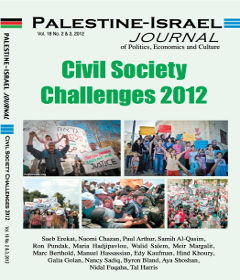Civil Society Organizations (CSOs) are playing an increasingly important role in modern societies. They complement the functioning of the governments by offering services that governments cannot because of budgetary restrictions, contribute to community development in all aspects of life and, most importantly, monitor the functioning of governments and complement the role of parliaments in ensuring accountability. This role is not absolute but is affected by conditions and circumstances within the society. And while the job of the CSO is welcomed in democratic societies, it is rejected and suppressed by authoritarian regimes.
In the first two and half decades after 1967, the Palestinian
CSOs developed to become an alternative to the Israeli occupation
and attempted to build a parallel infrastructure: a Palestinian
entity challenging the occupation and freeing itself from its
policy of containing or manipulating the activities of the CSOs.
Yet the Israeli military authorities
read more ...
